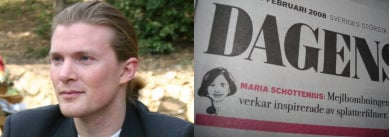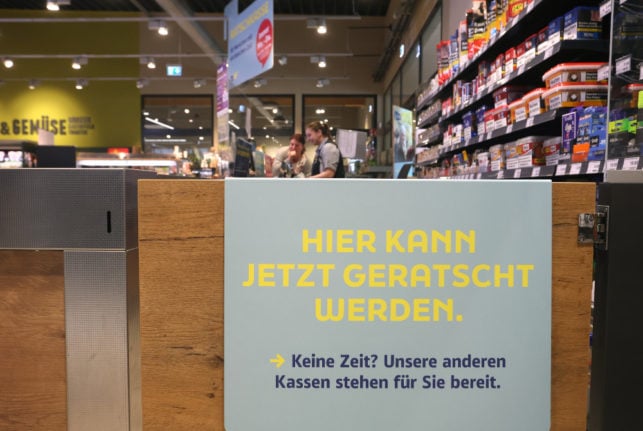I know it’s hard to follow every twist and turn when a debate really heats up, so for the sake of convenience I have summarized here the false assertions made about me by Andreas Malm at DN Kultur over the past week. Malm has told a total of three lies in order to portray me as a racist and an Islamophobe. These can easily be disproved:
1. It began on February 12th when Andreas Malm wrote an article characterizing Bruce Bawer’s book While Europe Slept as an Islamophobic tract with leanings similar to those of the Sweden Democrats. In this context, Malm tries to point to me as a central source of inspiration for Bawer:
“From Johan Norberg — one of the Swedish debaters cited by Bruce Bawer as an information source, alongside Dilsa Demirbag-Sten and Mauricio Rojas — he has learned that Sweden, while maybe not a one-party state, is a ‘one-idea state’ where kowtowing to Islam is endemic. And so Sweden suffers with a growing Muslim population that has ‘a disproportionate tendency towards violence’, has made the
murder rate ‘twice as high in Sweden as in the United States’, and is at its craziest in Malmö, ‘where the rape rate is five or six times higher than in Copenhagen, and child rape has doubled in ten years'”.
There are two assertions here: in the first, Malm accuses me of claiming that “kowtowing to Islam is endemic” in Sweden; in the second, he attempts to make it seem like Bawer has sourced the claims that follow from me (as well as from Demirbag-Sten and Rojas).
Both assertions are false. I have never written anything remotely like that and Bruce Bawer has never claimed that I have. My quote concerns the way in which the Social Democrats’ power over our institutions affects our view of state, market, growth and redistribution. Here is the original quote from Bawer’s book (page 46):
“Johan Norberg, a Swedish scholar, feels that the social-democratic establishment consensus is so significant a feature of Western European society that he’s given it a name: ‘the one-idea state’. Norberg (whose country has an even more lockstep elite than most) notes that ‘the social democrats’ power over our minds, authorities, universities and media starts a process of adaptation from all sides, including the opposition, so that individualists and innovators are shut out.'”
Islam and Muslims are not mentioned once on that page in Bawer’s book. I am referred to on just one further occasion in the book (page 127) in connection with a comparison between the relative per capita GDPs of the EU and the US. (The assertions about Demirbag-Sten and Rojas are also false — the quote from Rojas is not even about Muslims (it is about Swedes being a tribe that is too homogeneous for its own good).
2. When Dilsa Demirbag-Sten and I were given the opportunity to write a short reply on DN Kultur, Malm and the editorial team did not respond with a correction or an apology. Instead Malm was given the last word and another opportunity to repeat his lies (February 13th).
He also put two more lies in the mix. Unfortunately, I was not permitted to reply. Malm wrote:
“Sweden is described as a country in which nobody dares criticize Muslim immigration […] since Social Democrats have indoctrinated Swedes in a ‘one-idea state’. The writer who coined this term, and on whose ideas this reasoning is based, is Johan Norberg. […] It’s there in black and white in a book that is selling well and has
already been translated into several European languages.”
Yes, the term is mine, but the reasoning is not. (On the contrary, I have attacked the Social Democrats for their inhumane immigration policies, which of course have affected Muslims.) When discussing my description of a ‘one-idea state’, Bruce Bawer does not take up any arguments about mass immigration.
3. Later in the same text, Malm produces more false evidence in order to pin me down as an Islamophobe.
“In his blog Norberg complains that I ‘treat Bruce Bawer’s book While Europe Slept as an Islamophobic and racist contribution to the debate’. As if it were not just that. […] The lines between the Islamophobic and the liberal agendas have become ever more porous in the public debate of the western world.”
What I actually wrote on my blog was the following:
“While treating Bruce Bawer’s book While Europe Slept as an Islamophobic and racist contribution to the debate, Malm writes as follows: […]”
And here I go on to cite Malm’s attempt to associate me with Bawer’s book. What I said was simply a description of the content of Malm’s article and was in no way a criticism of his depiction of the book (which I have not read) as Islamophobic or racist.
Andreas Malm has lied about me three times, but DN Kultur is refusing to allow me to respond to the last two lies.
Hundreds of thousands of readers of Sweden’s biggest “quality” newspaper have seen me portrayed as an Islamophobe and a racist in articles that will define people’s view of me for some time to come. And I am not being given a chance to set the record straight.
In an interview with Sveriges Radio, DN’s culture editor Maria Schottenius characterized me as a “dogmatist” for my protests at being treated in this way.
When I asked her a direct question as to whether she, hypothetically speaking, would consider it problematic for somebody writing on her pages to lie in order to portray an opponent as a racist, she, quite remarkably, refused to comment.
Instead she replied that she cannot be held responsible for everything published in DN Kultur. The paper houses many different opinions, she said, some of which were “controversial”. This, she said, she found “interesting”.
It is perhaps relevant at this juncture to mention that I have supported an open borders policy on immigration for the last decade, I have hidden Muslim refugees from the Swedish authorities and argued that Europe probably wouldn’t have had the Renaissance and the Enlightenment if it hadn’t been for ideas imported from the Muslim
world.
This is something I have written about extensively in the past. I even had an article [in Swedish] on the subject published in DN Kultur. But that was before Maria Schottenius’s time.
Johan Norberg is a freelance writer and regular media commentator. He is the author of several books, including the award-winning In Defence of Global Capitalism (2001), which was later adapted by Channel 4 in the UK to form the basis of the documentary Globalisation is Good.





 Please whitelist us to continue reading.
Please whitelist us to continue reading.